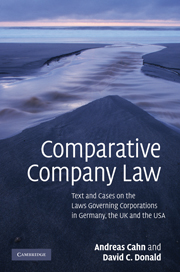 Comparative Company Law
Comparative Company Law Book contents
- Frontmatter
- Contents
- List of figures
- List of tables
- Preface and acknowledgments
- Glossary
- List of abbreviations
- Table of cases
- Table of legislation
- PART I The essential qualities of the corporation
- PART II The corporation and its capital
- PART III Governing the corporation
- SUBPART A The management
- SUBPART B The members
- 16 Shareholder voting rights
- 17 Shareholder information rights
- 18 Shareholder meetings
- 19 Shareholder duties
- 20 Judicial enforcement of shareholder rights
- PART IV Corporate combinations, groups and takeovers
- References
- Index
17 - Shareholder information rights
from SUBPART B - The members
- Frontmatter
- Contents
- List of figures
- List of tables
- Preface and acknowledgments
- Glossary
- List of abbreviations
- Table of cases
- Table of legislation
- PART I The essential qualities of the corporation
- PART II The corporation and its capital
- PART III Governing the corporation
- SUBPART A The management
- SUBPART B The members
- 16 Shareholder voting rights
- 17 Shareholder information rights
- 18 Shareholder meetings
- 19 Shareholder duties
- 20 Judicial enforcement of shareholder rights
- PART IV Corporate combinations, groups and takeovers
- References
- Index
Summary
Required reading
EU: Transparency Directive, arts. 1–7
D: AktG, §§ 124, 125, 131, 132, 142(1), 145, 243(4), 258(1) and (2), 259(1)
UK: CA 2006, secs. 238(1), 355, 423(1), 430(1), 431, 441, 444–447, 463, 1112, 1136; FSA Disclosure and Transparency Rules, Rules 1.1.1, 1.3.4, 2.2.1, 2.3.2, 2.5, 3.1, 4.1.1, 4.1.5, 4.2.1, 4.2.2, 4.3.1, 4.3.2, 4.3.6, 6.1.2, 6.1.9; FSA Listing Rules, Rule 9.2.6, 9.6, 9.7A.1, 9.8.4, 9.8.6, 9.8.8, 10.3.1, 11.1.7
US: DGCL, §§ 219, 220; Exchange Act Rules 14a-3(a) and 14a-7(a); scan each item of Schedule 14A
The information rights of shareholders
In the previous chapter, we looked at the voting rights of shareholders. Before a shareholder can exercise a voting right, he must be able to make a decision about the matter up for vote, and this presupposes access to information. The information rights of shareholders come in three basic forms: (i) inspection upon request; (ii) routine, regular disclosure; and (iii) ad hoc disclosure of significant events. When a company is small and the shareholders are in close contact with the management, inspection upon request is a good way to obtain information because it is flexible and provides only what the shareholder needs. This type of inspection is provided for in different forms in the company law statutes of our three jurisdictions. When a company lists its securities on the capital market, however, the number of shareholders can dramatically increase and the geographical proximity of shareholders to management usually decreases.
- Type
- Chapter
- Information
- Comparative Company LawText and Cases on the Laws Governing Corporations in Germany, the UK and the USA, pp. 510 - 545Publisher: Cambridge University PressPrint publication year: 2010


